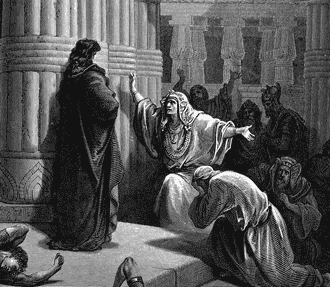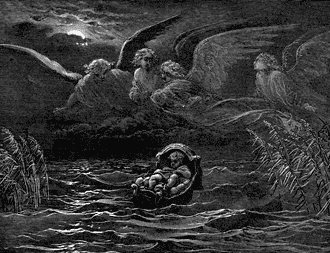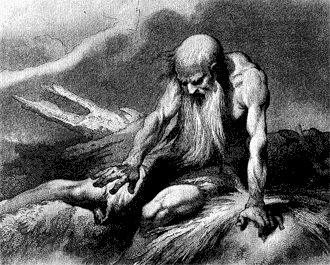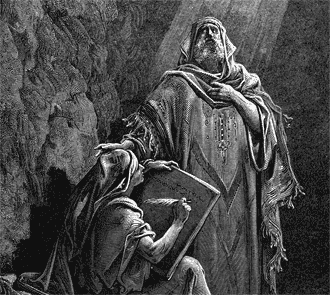Saturday, September 23, 2006
God the Playwright (Exodus 5-11)

Moses and Aaron confront Pharaoh, announcing that the god of the Israelites commands his people to celebrate a three-day festival to him in the wilderness, so they'll need some time off work. Pharaoh is indigent at the cheek of these slaves: they're thinking about throwing a massive party? Seems they have too much time on their hands!
Of course, we're told that God's intention is to lead his people out of Egypt for good, not just for three days. It seems awfully deceptive. I suppose the idea is that even this little thing Pharaoh won't allow - making his eventual loss of all his slaves all the more tragic for him.
The play God is directing is, in part, a tragedy in the Shakespearian sense: it involves the ruin of a proud man through his own fault. The Lord has already written the script and finished the casting:
You shall speak all that I command you, and your brother Aaron shall tell Pharaoh to let the people of Israel go out of his land. But I will harden Pharaoh's heart, and though I multiply my signs and wonders in the land of Egypt, Pharaoh will not listen to you. Then I will lay my hand on Egypt and bring my hosts, my people the children of Israel, out of the land of Egypt by great acts of judgment. The Egyptians shall know that I am the Lord, when I stretch out my hand against Egypt and bring out the people of Israel from among them.That's pretty much how it happens. Moses confronts Pharaoh time and time again, visiting plague after plague on Egypt, but he refuses to let the people go on their wilderness pilgrimage. God hardens his heart, so that the birth of Israel as a nation will be so dramatic and powerful that it will be told for generations to come:
I have hardened his heart and the heart of his servants, that I may show these signs of mine among them, and that you may tell in the hearing of your son and of your grandson how I have dealt harshly with the Egyptians and what signs I have done among them, that you may know that I am the Lord.Even though the Lord's judgment on Egypt is the shining moment of Israel's story, it is really troubling for the modern ear (though Calvinists adore it). What is this business about the Lord hardening Pharaoh? Is he forcing a man to be evil against his will? Does God actually want him to be bad just so that he can punish him all the more?
We get into deep waters pretty quickly. Is God sovereign or is man a free moral agent? I have to answer "yes" to this either/or question, and my answer holds for the example of Pharaoh. Let's take a closer look at what God is doing.
In his vast redemptive project of man and all creation, God has promised to create a nation from Abraham's seed. This nation will be a platform for God's engagement with the world, and a template for his plans for all mankind. He has specifically chosen a group of "God-wrestlers", people who will both follow him recklessly and fight with him passionately. He knows that the imaginations of man's heart are evil even from his youth. If this project has any hope of success, God is going to have to kick things off with an act so powerful and memorable that the people won't forget.
To this end, God needs to clash with the world's greatest millitary and cultural power in an epic battle. He needs a mighty figure to play the part of the villain. And what better man than Pharaoh, the son of the king who drowned the baby boys of the Israelites? He is a perfect fit. And so God grooms him to be the best he can be:
For by now I could have put out my hand and struck you and your people with pestilence, and you would have been cut off from the earth. But for this purpose I have raised you up, to show you my power, so that my name may be proclaimed in all the earth. You are still exalting yourself against my people and will not let them go. Behold, about this time tomorrow I will cause very heavy hail to fall, such as never has been in Egypt from the day it was founded until now. Now therefore send, get your livestock and all that you have in the field into safe shelter, for every man and beast that is in the field and is not brought home will die when the hail falls on them.In this plague at least, the Egyptians are free to choose whether to fear God or resist him. But they are not free to thwart his purposes. This is God's story, and both his heroes and villains move it inevitably to the great climax.
Click Here to Continue Reading this Post...
Monday, September 18, 2006
Out of Egypt I Called My Son (Exodus 1-4)

Genesis ended with the sons of Jacob safe in Egypt. Though in Canaan they were often threatened with famine and hostile neighbors, here Joseph’s work and influence give their fledgling tribe a chance to flourish and multiply. If Israel is the Lord’s “firstborn son,” then Goshen in Egypt is the protective womb - keeping the vulnerable child safe while he grows strong enough to survive in the outside world.
The child is soon fully grown, and Israel can only get out of the womb by enduring the agony and danger of birth. The new Pharaoh, who never knew Joseph, is only too happy to dish out the labor. But the pain of slavery isn’t enough, and Pharaoh makes the infamous order to throw all the Hebrew baby boys into the river.
Baby Moses survives the ordeal, floating atop the water in the basket his mother made, and lands in the merciful arms of Pharaoh’s daughter. Upon growing up, Moses runs into an Egyptian beating a Hebrew. Moved with pity, he kills the attacker, and is then forced to flee the country.
It’s here that Moses runs into the Lord speaking from the burning bush. God has remembered his covenant with Israel, and is gearing up to bring them out of Egypt and into Canaan. And what better man to lead them than Moses - a man so compassionate toward the stricken people that he compromised his own privileged position to bring relief to a beaten slave?
The problem is that Moses isn’t interested! What follows is a cringe-inducing exchange, with Moses offering one excuse after another to try to get out of God’s call (each one more pathetic than the last):
Who am I that I should go to Pharaoh and bring the children of Israel out of Egypt?God is noticeably irritated with Moses’ whining. His retort is profound and devastating:
If I come to the people of Israel and say to them, ‘The God of your fathers has sent me to you,’ and they ask me, ‘What is his name?’ what shall I say to them?
But behold, they will not believe me or listen to my voice, for they will say, ‘The Lord did not appear to you.’
Oh, my Lord, I am not eloquent, either in the past or since you have spoken to your servant, but I am slow of speech and of tongue.
Who has made man's mouth? Who makes him mute, or deaf, or seeing, or blind? Is it not I, the Lord? Now therefore go, and I will be with your mouth and teach you what you shall speak.To which Moses simply resorts to begging “please send someone else!” This time the Lord is furious, and rightly so! Yet, amazingly, he condescends to negociate with Moses. In the end Moses gets God’s name, an arsenal of miracles, and Aaron as a spokesman.
Why does the Lord put up with this nonsense? Why choose someone like Moses, a man reluctant enough to argue with God? It reminds me a little of Abraham at Sodom and Jacob wrestling with God. The Lord seems to prefer men who have the spunk to spar with him. And a good thing too! The people will need someone willing to argue on their behalf soon enough.
Click Here to Continue Reading this Post...
Wednesday, September 13, 2006
Myths in Our Bible?

A while back I wrote a rather presumptuous and muddled post on the nature of mythology and the book of Genesis, where I made some knocks at Creationist literalism. As is often the case, the comments ended up being more interesting than the post itself. Em summed it up like this:
Are the fantastical-sounding parts of GenesisShe’s right – I think it’s divine art (although I don’t know that it’s really closer to B than A). They are stories that, while cloudy regarding hard historical data or scientific information, nevertheless are the best way for us to understand both ourselves and our origins. Myth can be a way of telling about something that really happened in a way that a modern scientific observer never would. The scientist, seeing the origin of the universe, describes the mathematics of the big bang. The writer of Genesis, his imagination inexplicably guided by the Spirit, sees God saying “let there be light.” Both see true things, but the mythmaker sees the deeper truth.
A) Historical accounts,
B) Simple allegories written to teach us abstract principles, or
C) Lies crafted by those evil theists?
Your answer, as far as I can figure, is simply "No," though it leans closest to B. Maybe you add a choice D that you call "art," which is way cooler than A or B but contains elements of both.
Iambic Admonit, a fellow blogger, took issue with me in the comments. If the events of Genesis aren’t accurate historically, then they are not true. It is only after historical and scientific accuracy have been established that we need look for emotional or symbolic value as myth:
So I want to say that Genesis is not mythology, that it is science and history. The only way it is “true myth,” in the Lewis/Tolkien sense, is that it has all the emotional power and mythic symbolism and cyclical resonance of myth.I do think Lewis was talking fundamentally of the Gospels as “myth becoming fact” and that he saw the beginning of Genesis as mythology proper, but the point is a serious one. Am I shying from wrestling with the Bible when I promised otherwise? Am I just pretending the Bible is trying to tell us something other than what it is actually saying, because I am uncomfortable with it flying in the face of modern science (oh me of little faith)?
I hope not. But I can put the question the other way around. Where do we get the notion that only science and history are appropriate genres for Holy Scripture? Are we making myths in the Bible out to be history and science because we don’t see how anything but these type of facts can be true?
This is why some have said that the liberal/fundamentalist debates of the 20th century had both sides united in being fully modern (a horrible era for the arts, by the way). The liberals rejected anything fantastic in the Bible as mythology and the fundamentalists defended the Bible by insisting that it wasn’t mythology. If forced to choose between the two, I have to side with the fundamentalists, as there's no way I'm throwing out the history of the Gospels or the Resurrection! But the point is that neither side stopped to think that a little mythology might be something worth having in the inspired word of God. Just the facts, ma’am.
What if God, in his divine wisdom, wanted to employ the poetic artistic vehicle of mythology in kicking off the greatest book ever written? What if the Spirit can use mythology to guide us in all truth, where the bare historical facts wouldn’t? By what principle do we rule this out?
The discussion of myths in Genesis continues here.
Click Here to Continue Reading this Post...
Saturday, September 09, 2006
The Book of Job

Job is one of the most mysterious and perplexing books of the Bible. It grapples with the problem of reconciling the suffering of good people with the justice of God. We are left with the paradox of the futility and absolute necessity of wrestling with our maker. The conclusion, foiling both the pessimism of those in despair and the naive theology of those who attempt to defend God in the face of suffering, is both initially frustrating and deeply satisfying.
Here are all the posts, with astricks by what I think were the better ones:
Click Here to Continue Reading this Post...
Thursday, September 07, 2006
Fighting with the Bible

When I asked the question, “what do we do with the troubling parts of the Old Testament?”, there were a couple of reasons I thought the book of Job would have some good insights. Comparing my difficulties with Job’s might make this a little clearer.
In reading scripture, we come across actions attributed to God that are in tension with what we know of ultimate justice, goodness, compassion, and wisdom. Why command the destruction of entire peoples? Why indiscriminately slaughter rich tyrants and poor beggars? Why kill David’s infant son for his murder of Uriah, while killing poor Uzzah for a harmless attempt to keep the Ark from falling? Shall not the judge of all the Earth do what is just?
Job faced actions by God that cause similar tension. Why bring a righteous and godly man to ruin? Why make him a laughingstock in front of his friends? Why kill his sons and daughters while wicked men live in happiness? Why are not times of judgment kept by the Almighty?
I suggest we take Job as our guide through these dark waters, imitating him as he imitates Christ.
On the left hand is the voice of Job’s wife, mockingly asking, “Do you still hold fast to that archaic Old Testament? Curse it and move on!” To this Job responds, “You speak as one of the arrogant moderns speak. Shall we praise Jesus for his enlightenment, and reject the very scriptures that were his lifeblood?”
On the right are Job’s three friends, defending the inerrancy of scripture at all costs. “Does God put imperfection in the Bible? If something seems unjust to you, then it is your notion of justice that is flawed.” To this Job answers, “Will you defend what you know to be wicked (like mass genocide), in an attempt to justify scripture? Will the righteous judge, who gave you your conscience and your intellect, be impressed with a blind faith that would follow an evil god as quickly as a good one?”
So we scuffle with scripture. We reject any compromise or middle ground for the paradox of Job’s position:
Though he slay me, I will hope in him;To be sure, our hubris is absurd, and we will be humbled. God himself will appear out of the whirlwind and ask, “Where were you when the ancient forerunners and prophets wrote the Bible? Do you know how the words of dozens of free human authors, each with their own insights and faults, constitute the very words of God? What book are you going to write that will shape the world? Do you indeed know what my purposes are for each passage, and why I have written what has been written?”
yet I will argue my ways to his face.
We did indeed utter what we did not understand. Our attempts to synthesize the Bible into a coherent model fall to pieces in the presence of the author Himself. We find ourselves immersed in His story, being shaped by our feisty struggle in ways we never imagined. With the great Russian novelist Fyodor Dostoyevsky, we gasp in marvel:
What a book is the Holy Scripture, what miracle, what power are given to man with it! Like a carven image of the world, and of man, and of human characters, and everything is named and set forth unto ages of ages.
Click Here to Continue Reading this Post...
Home
Who is Oyarsa?
Contact Me
Blog the Bible
Recent Comments
Archives
- June 2006
- July 2006
- August 2006
- September 2006
- October 2006
- November 2006
- December 2006
- January 2007
- February 2007
- March 2007
- April 2007
- May 2007
- June 2007
- July 2007
- August 2007
- September 2007
- October 2007
- November 2007
- December 2007
- January 2008
- February 2008
- March 2008
- April 2008
- May 2008
- June 2008
- July 2008
- September 2008
- October 2008
- November 2008
- July 2009
- August 2009
- January 2010
- August 2010
Recommended Books